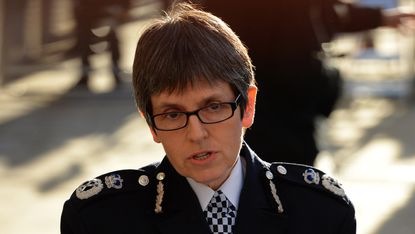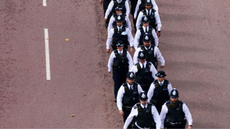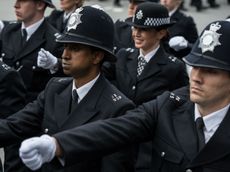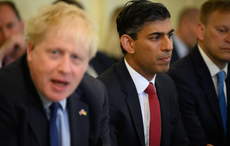Cressida Dick appointed first female Scotland Yard commissioner
First woman to take control of force in 188 years is 'thrilled and humbled' by the 'amazing opportunity'

Former national counter-terrorism chief Cressida Dick will be the next commissioner of the Metropolitan Police, becoming the first woman to take charge of the London force in its 188 years.
She will replace Sir Bernard Hogan-Howe, who has spent more than five years in office.
Dick, who has worked for the Foreign Office since leaving the force in 2015, said she was "thrilled and humbled", calling the role a "great responsibility and an amazing opportunity".
Subscribe to The Week
Escape your echo chamber. Get the facts behind the news, plus analysis from multiple perspectives.

Sign up for The Week's Free Newsletters
From our morning news briefing to a weekly Good News Newsletter, get the best of The Week delivered directly to your inbox.
From our morning news briefing to a weekly Good News Newsletter, get the best of The Week delivered directly to your inbox.
Home Secretary Amber Rudd said: "Cressida Dick is an exceptional leader and has a clear vision for the future of the Metropolitan Police and an understanding of the diverse range of communities it serves."
Dick's rise to the top of London's police force comes despite the controversy around her role in the operation that led to the 2005 killing of Jean Charles de Menezes, who was shot dead by a police officer after being mistaken for a suicide bomber, reports The Guardian.
While the force as an organisation was found guilty of breaching health and safety laws, the jury said Dick herself should not be held culpable, a decision upheld by the European Court of Human Rights last year.
Dick, who has a degree from Oxford University and a masters in criminology from Cambridge, joined the Met in 1983 and held the post of national lead for counter-terrorism for three years, during which she led the London Olympics security operation in 2012. She retired as the Met's assistant commissioner for specialist operations in 2015.
Steve White, chairman of the Police Federation of England and Wales, described her as a popular choice among rank and file officers.
He said: "This is one of the most significant roles in British policing and with it comes significant responsibility, not just in the public's eyes but in those of the staff and officers looking for strong, resilient leadership at a time of significant ongoing change across the service."
The Met is Britain's biggest force, taking up about a quarter of the money spent on policing in England and Wales. It was founded in 1829 and has national functions including counter-terrorism and diplomatic and VIP protection, as well as covering London.
Create an account with the same email registered to your subscription to unlock access.
Sign up for Today's Best Articles in your inbox
A free daily email with the biggest news stories of the day – and the best features from TheWeek.com
-
 The Week Unwrapped: Policing, Sweden’s far-right and ‘passkeys’
The Week Unwrapped: Policing, Sweden’s far-right and ‘passkeys’podcast Can the Metropolitan Police’s new commissioner fix the force’s problems? Why has Sweden swung to the political right? And are passwords set to become obsolete?
By The Week Staff Published
-
 Met bans officers from ‘Porn Idol’ contest
Met bans officers from ‘Porn Idol’ contestfeature And other stories from the stranger side of life
By The Week Staff Published
-
 ‘Will Rishi Sunak jump, or will he be pushed?’
‘Will Rishi Sunak jump, or will he be pushed?’Instant Opinion Your digest of analysis from the British and international press
By The best columns Published
-
 Home Office worker accused of spiking mistress’s drink with abortion drug
Home Office worker accused of spiking mistress’s drink with abortion drugSpeed Read Darren Burke had failed to convince his girlfriend to terminate pregnancy
By The Week Staff Published
-
 In hock to Moscow: exploring Germany’s woeful energy policy
In hock to Moscow: exploring Germany’s woeful energy policySpeed Read Don’t expect Berlin to wean itself off Russian gas any time soon
By The Week Staff Published
-
 Were Covid restrictions dropped too soon?
Were Covid restrictions dropped too soon?Speed Read ‘Living with Covid’ is already proving problematic – just look at the travel chaos this week
By The Week Staff Last updated
-
 Inclusive Britain: a new strategy for tackling racism in the UK
Inclusive Britain: a new strategy for tackling racism in the UKSpeed Read Government has revealed action plan setting out 74 steps that ministers will take
By The Week Staff Published
-
 Sandy Hook families vs. Remington: a small victory over the gunmakers
Sandy Hook families vs. Remington: a small victory over the gunmakersSpeed Read Last week the families settled a lawsuit for $73m against the manufacturer
By The Week Staff Published


